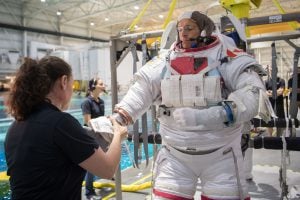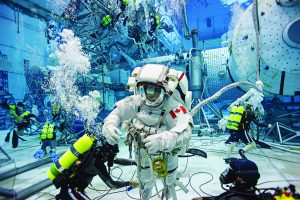
Exploration
Preparing for launch
A conversation with Canadian astronaut David Saint-Jacques, who is getting ready to travel to the International Space Station
- 1967 words
- 8 minutes
People & Culture
As NASA and the world’s space agencies prepare to return to the moon, geologist Dr. Gordon "Oz" Osinski helps train potential lunar explorers in remote northern Labrador on what they could find there

Geologist Dr. Gordon “Oz” Osinski joins us on the pod to talk about his fascinating expedition with two astronauts to the massive Kamestastin meteor crater in remote northern Labrador. With NASA and the world’s space agencies preparing to return to the moon, Dr. Oz is helping train potential lunar explorers on what they could find there. The 35 million year old Kamestastin crater is both similar in size and shape to the many craters on the moon, and it contains rare space rocks also found on the lunar surface. Dr. Oz discusses why a return to the moon is important, why the discovery of water on the moon could be a game changer and he also shares why Devon Island, in the high arctic, is his favourite place in Canada.
Dr. Osinksi is a Fellow of the Royal Canadian Geographical Society, Professor of Earth Sciences and Research Chair of Earth and Space Exploration at Western University. He is also the Director of the Institute for Earth and Space Exploration, Director of the Canadian Lunar Research Network, and Chair of the Planetary Sciences Division of the Geological Association of Canada.
Are you passionate about Canadian geography?
You can support Canadian Geographic in 3 ways:

Exploration
A conversation with Canadian astronaut David Saint-Jacques, who is getting ready to travel to the International Space Station

Science & Tech
From enduring extreme isolation and psychological strain to operating high-tech robotics and undergoing an intense physical fitness regimen, here’s a glimpse at what it takes to head to space

People & Culture
The story of how a critically endangered Indigenous language can be saved

People & Culture
March 30 is the launch date! The Montreal-born investor and philanthropist will complete a 10-day mission that combines bucket-list trip with research and environmental agenda